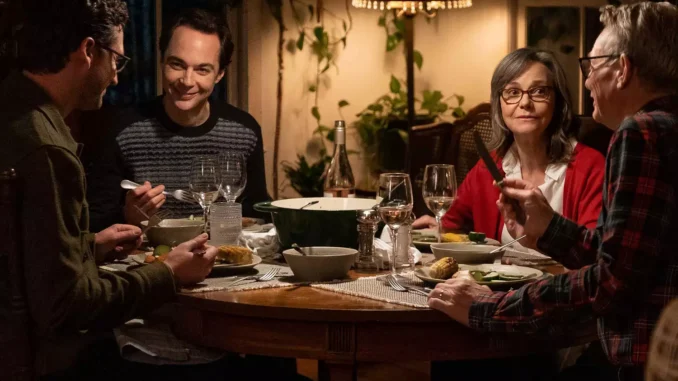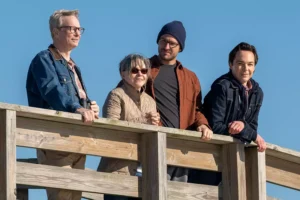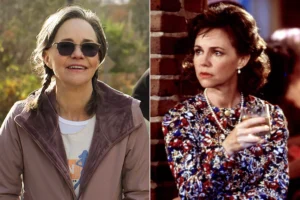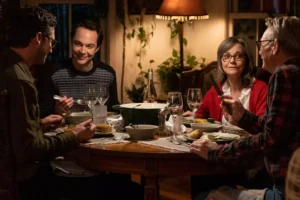
Sally Field on the parallels between playing a grieving mother in Spoiler Alert and Steel Magnolias
“You can’t say one is harder — both of those were acting challenges in my life,” says the Oscar winner.Sally Field seems to have a knack for playing mothers who lose their children.
The actress, 76, delivered one of the most iconic on-screen monologues ever as M’Lynn in 1989’s Steel Magnolias as she breaks down at the graveside of her daughter Shelby (Julia Roberts). In Spoiler Alert, expanding its limited release on Dec. 9, she lives through another family tragedy, saying goodbye to her son Kit (Ben Aldridge) as he dies from cancer.
“Emotional work is always hard,” Field says. “But I knew that this wasn’t like Steel Magnolias or many other things that I’ve done where you feel like you’re slicing your wrists and losing years off your life because of how hard you have to work to get to these emotional places. The task was to stay away from it until it was ready to shoot, because it was just so there and it was so raw. The difficult thing [here] was to not feel it until it was time to feel it.”

So would Field call Steel Magnolias a harder scene to play? “You can’t say harder,” she demurs. “They were both acting challenges in my life. Steel Magnolias, that monologue is a great monologue. Every aspiring actor tries to conquer that monologue. It’s full of everything. But you get in the car at the end of the day, and the best feeling is when you could go home and go, ‘Okay, I did my work. I did what I knew to do.’ Could you have been better? Probably always yes. But I did the very best that I possibly could in this day’s work, and that’s all there is.”
Field re-teams with Brothers and Sisters showrunner David Marshall Grant and Hello, My Name Is Doris director Michael Showalter for Spoiler Alert, adapted from journalist Michael Ausiello’s memoir about losing his longtime partner, Kit, to cancer. She costars as Marilyn, Kit’s mother. SALLY FIELD: This came my way because I got a phone call from two of the people I love most in this industry or on Earth — Michael Showalter and David Marshall Grant. When they called together, and said they were doing a a project, I was like, “Whoa, the two of you together.” They wanted me to be in it. I said, “Absolutely, I’m there. I’m in.” And they said, “Well, at least read it first, will you?” I did, and it’s such a lovely story about how hard it is to love someone, whether it’s the parents loving each other, loving their child, or this couple.

Ausiello is a producer on this. How much did you turn to him for insight on Marilyn and Kit?
Not at all. I hardly talked to him. He was on the set every day, but, though it is taken from his memoir, I’m not playing his memoir. Marilyn and Bob (Bill Irwin) really do exist, thank goodness. But I never met them. I know they’re very private people. We had to take what was in the screenplay and bring that alive to service the story we were telling of this love affair. My allegiance was not really in accurately portraying who Marilyn really might be. Was that exactly what happened? Who knows? Were those verbatim the words? Probably not, because we did a lot of improv to bring it to life.
I have found that if you’re doing a character that really did exist — it’s one thing if you’re doing a historical character where people know what they looked like or how they behaved or how they sounded or walked or any of that — then part of your responsibility is bringing that person through you alive as much as you can, trying to replicate their voice or their walk. But I didn’t have that requirement with this because they’re people that are unfamiliar to the public. My task had to be to bring Marilyn and what was there to life within the context of the movie we were making.
One of my favorite scenes in the movie is where Kit is backed into coming out to his parents after keeping it a secret for a long time. They respond warmly, in a fashion he’s not expecting. Your youngest son is openly gay. Were you drawing on any experiences with him for that moment?

Well, all actors draw on themselves. Whether it be absolutely, specifically, or an awareness that stays there. But this was not my experience — what Kit went through as compared to what my life was, and what I went through or my son. So, I wouldn’t say that it wasn’t in any way, shape, or form in the mix because actors bring in their own existence whether they want to or not, whether they call on it or not. But this is very different than my life and what my son’s life is like.
